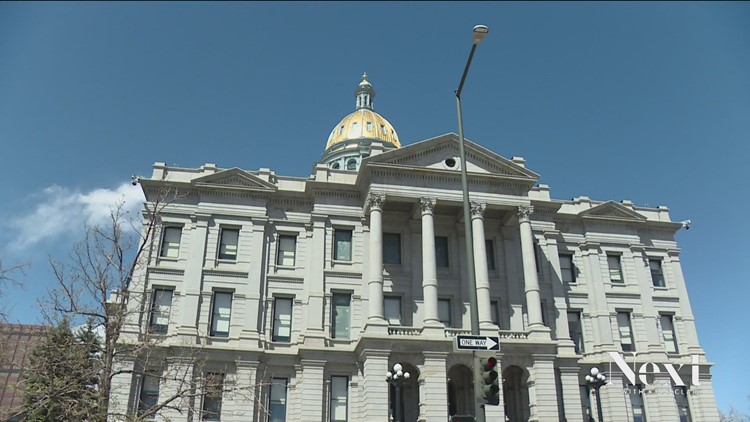[ad_1]

Nearly one-third of state lawmakers were appointed by a vacancy committee. A new bill would restrict those people from running in the next election.
COLORADO, USA — The side door at the Colorado State Capitol is magnetic lock protected, but for nearly one-third of state lawmakers, it acts like a revolving door.
Vacancy committees appointed 29 of the 100 current members of the state legislature.
For example, State Sen. Perry Will, R-New Castle, lost his reelection for state House in November 2022. In January 2023, a vacancy committee picked him to finish the term for former Republican state Sen. Bob Rankin, who stepped down. Will, who had just lost his reelection, was picked by four out of six people to fill Rankin’s final two years.
Several lawmakers who have entered the state capitol through the side door have said they think the vacancy committee process needs work. Though, none have proposed bills to change the process.
State Rep. Bob Marshall, D-Highlands Ranch, is an exception.
“I beat someone who was appointed,” Marshall said.
He beat a Republican lawmaker who was appointed to finish the term of another Republican lawmaker who had resigned. It is rare that a hand-picked lawmaker is not reelected at the next election by voters.
Yet, he is the lawmaker who sponsored a bill to change the process.
If two-thirds of the state House and state Senate approve, his bill would refer the issue to voters. If passed, the measure would bar an appointed lawmaker from running in that seat’s next election.
“Some of our most outstanding legislators are appointees, but we’re at 28 of 100 now, and if we’re a democratic system, that just looks really bad,” Marshall said.
With so many lawmakers that got their start by vacancy appointment, it is understandable to lose track. The current number is 29.
“I don’t like the vacancy process. I think the vacancy process is a process that can absolutely be improved on,” State Rep. Lorena Garcia, D-Adams County, said.
Garcia was appointed by vacancy committee (24 out of 39 votes) at the start of 2023 and will be on her first ballot this November.
She disagreed that she has a head start just because she was appointed.
“If you go into the community and you take a ballot to any random person and you say, ‘who is the incumbent?’ I guarantee you most people are going to be like, ‘what is an incumbent?’ Number two, if you ask them who’s been serving in office, they’re going to look and say, ‘I don’t know,’” Garcia said. “The way that the ballot is set up and the lack of civics education that we have in this state, does not facilitate for something to be automatic just because you’re serving already.”
Garcia still would like to see a better process.
“If we really want to address vacancies, we need to address, how within a vacancy process we can engage the broader community. For me that’s transparency. Our vacancy process is not transparent,” Garcia said.
She said that she has not brought her own bill to address vacancies because she is allowed five and it is not a top-five issue that her constituents talk with her about.
“They’re saying our priorities are this, this, this, this and this and vacancy is not of them. Am I doing my community a service or a disservice in ignoring these other issues that they claim is a priority?” Garcia said. “Could I run legislation that requires transparency in the process, that maybe expands the vacancy committee? Yeah. So, maybe I just should.”
Marshall’s bill was heard in its first committee Monday: a committee with four of the 11 lawmakers that became lawmakers through a vacancy committee.
“I am a ‘no’ vote on this bill. This bill would not have served my community,” State Rep. Kyle Brown, D-Louisville, said.
Brown was appointed through a vacancy committee with 41 out of 51 votes. He took over for former State Rep. Tracey Bernett, who resigned after she faced criminal charges for lying about where she lived.
He told the committee members that someone who would not be able to run in the next election might not be as passionate about issues surrounding the Marshall Fire, as he has been.
State Rep. Manny Rutinel, D-Adams County, was also on the committee that heard Marshall’s bill. He was appointed last year with 23 out of 28 votes.
Two other committee members, State Rep. Steven Woodrow, D-Denver and State Rep. Andrew Boesenecker, D-Fort Collins, have both won an election since being appointed.
Woodrow was appointed with 41 out of 71 votes, and Boesnecker was appointed with 43 out of 55 votes.
During the committee hearing, State Rep. Jenny Willford, D-Northglenn, asked about other issues that have resulted in lawmakers resigning.
“Why not look at addressing some of the root causes for the reasons that people leave the legislature? We often talk about the low pay, in connection to the amount of work. We talk about the toxic workplace. Why not look at root causes?” Willford asked Marshall.
The last two lawmakers to resign, Said Sharbini and Ruby Dickson, cited low pay and a hostile work environment.
“Unless those root causes, all of a sudden, became an issue over the last 10 or 15 years in a more acute fashion, I’d have to say I don’t think that is the problem for this issue,” Marshall said.
No other lawmaker has introduced legislation to address salaries. There is legislation that has been introduced that deals with workplace harassment and discrimination.
There is also an effort by former DaVita CEO Kent Thiry to put a ballot issue in front of voters to overhaul how elections are run in Colorado. One of the proposals would change vacancy committees to a special election.
“One, they’re very expensive. And two, there is a delay,” Marshall said.
“I agree with the idea, that sure, it would be great to have special elections. That’s a lot of responsibility and a lot of money to put on our counties,” Garcia said.
Marshall’s ballot issue would need to pass both the House and Senate with two-thirds support for it to appear on the November ballot.
“We all know it’s an issue. I wasn’t going to go back to my district and say, ‘I knew about this issue all session and I took no action whatsoever on it,’” Marshall said.
SUGGESTED VIDEOS: Full Episodes of Next with Kyle Clark
[ad_2]
Source link




